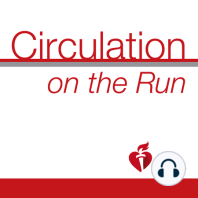17 min listen
Circulation September 01, 2020 Issue
ratings:
Length:
24 minutes
Released:
Aug 31, 2020
Format:
Podcast episode
Description
This week’s episode includes author Allan Sniderman and Associate Editor Anand Rohatgi as they discuss the expected 30-year benefits of early versus delayed primary prevention of cardiovascular disease by lipid lowering and management. TRANSCRIPT: Dr Greg Hundley: Welcome everyone to this September 1 issue, as we start into the fall in North America, and I guess we're getting into spring-ish in the Southern hemisphere. Today, it's just myself, Dr Greg Hundley, Associate Editor and Director of the Pauley Heart Center at VCU Health in Richmond, Virginia. And, I'm so sad because my good friend, Carolyn, cannot be with us today. However, we have a great feature for the latter half of this recording and discussing some of the benefits of primary prevention using lipid lowering therapy to help prevent cardiovascular disease. But, before we get to that, let's grab a cup of coffee and let's go through some of the other articles in this issue. So, the first one is from the world of basic science and it's from Professor Eldad Tzahor, from the Weizmann Institute of Science. And, it's focusing on Agrin. So, this team previously reported that a fragment of the extracellular matrix protein, Agrin, promoted cardiac regeneration following myocardial infarction in adult mice. And, in this study the investigators propose to test the therapeutic potential of Agrin in a preclinical porcine model. They performed ischemia reperfusion injuries using balloon occlusion for 60 minutes, followed by either a 3, 7, or 28-day reperfusion period. They demonstrated that local antegrade delivery of recombinant human Agrin, or RH Agrin, to the infarcted pig heart can target the effected regions in an efficient and clinically relevant manner. In fact, a single dose of recombinant human Agrin improved heart function, reduced infarct size, reduced fibrosis and reduced adverse remodeling parameters, 28 days post myocardial infarction. Short-term myocardial infarction experiments, along with complementary mirroring studies, revealed myocardial protection, improved angiogenesis, inflammatory suppression, and cell cycle reentry as aggregation mechanisms of action. So in summary, this team demonstrated that a single dose of Agrin was capable of reducing ischemia reperfusion injury and improving heart function. Demonstrating that Agrin could serve as a therapy for patients with acute MI and potentially heart failure. So, this set the stage for future studies in human subjects. Okay. Well, our next paper is clinical and evaluates exposure to air pollution and particle radioactivity with a risk of ventricular arrhythmias. And, it comes to us from Ms. Ajani Peralta from Harvard University. Now, individuals are exposed to air pollution and ionizing radiation from natural sources through inhalation of particles. So, in this study, the team investigated the association between cardiac arrhythmias and short-term exposures to find particulate matter, PM 2.5, and particle radioactivity. So, ventricular arrhythmogenic events were identified among 176 patients with dual chamber implanted cardio defibrillators in Boston, Massachusetts, between the period of time of September 2006 and June 2010. And, patients were assigned exposures based on their residential addresses. So, what did they find? Well, in this high-risk population, those with these defibrillators, intermediate, 21-day parts per million, 2.5 exposure was associated with higher odds of a ventricular arrhythmia event onset among those with known cardiac disease and indication for ICD implantation. But this was independent of particle radioactivity. So, important information coming to us relating to air pollution and ionizing radiation in relation to ventricular events. Next, let's get back to another informative study from the world of basic science. And, this one involves genomic binding patterns of forkhead box protein 01 and how that is implicated in the development of cardiac hypertrophy. The study comes to us from W
Released:
Aug 31, 2020
Format:
Podcast episode
Titles in the series (100)
Circulation January 24, 2017 Issue: Circulation Weekly: Your Weekly Summary & Backstage Pass To The Journal by Circulation on the Run
